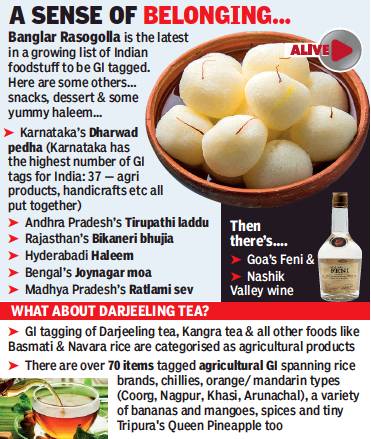Geographical Indication and India
This is a collection of articles archived for the excellence of their content. |
Contents |
Products, in brief

From: November 15, 2017: The Times of India
See graphic:
Geographical Indication (GI) tag, some important items to be tagged, as in November 2017
Enforceability of GI tags
Rupali Mukherjee, ’GI tag not extendable to unrelated biz’, February 6, 2019: The Times of India
While corporate battles protecting patents and trademarks are fairly common, the right to enforce a geographical indication (GI) tag has had a new twist. The Calcutta high court has ruled that Darjeeling Tea as a GI — owned by the government-run Tea Board — for tea originating from the region cannot be claimed for unrelated goods or services.
The order came on a case filed by the Tea Board against hotels-to-tobacco conglomerate ITC in 2010 for operating a premier lounge — ‘Darjeeling Lounge’ — at its ITC Sonar Hotel in Kolkata. The plea was dismissed as the court ruled that the GI held by Tea Board is restricted to only goods (tea), and not to services such as lounges.
Simply put, GI are names, geographical or figurative representation conveying or suggesting the ‘geographical’ origin of the products. The HC order is one of the first interpreting rights available to a GI holder, which legal experts say will help in defining the ambit of protection provided by GI law in India.
GIs registered in India include Darjeeling Tea, Mysore Sandal Soap, Alphonso mango and Surat Zari Craft. The Tea Board was attempting to monopolise the name Darjeeling for itself for all goods and services, even though they have a registration for only tea. Such claim has been denied by court, said Kironjit B Majumder from S Majumdar & Co, the law firm representing ITC.
The Geographical Indications of Goods (Registration and Protection) Act was enacted in India in September 2003, and soon thereafter the Tea Board filed and obtained registration for the GI ‘Darjeeling’. It then filed opposition to the registration of ITC’s application for registration of the trade mark Darjeeling Lounge, citing infringement of GI and Certification Trade Marks. Thereafter, it filed a suit in 2010, seeking interim injunctions against ITC to restrain the company for using Darjeeling Lounge.
In its suit, Tea Board said ‘Darjeeling’ is associated exclusively with ‘Darjeeling Tea’, and use of ‘Darjeeling’ in respect of lounge services is detrimental to the distinctive character of its GI. Also, use of ‘Darjeeling Lounge’ is an act of unfair competition, and has the effect of causing confusion among guests visiting the lounge, and guests would believe that there is some association of Darjeeling Lounge with Darjeeling Tea, or the Tea Board.